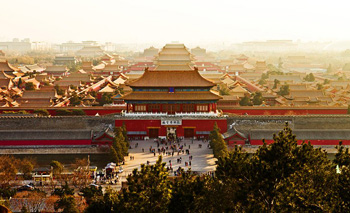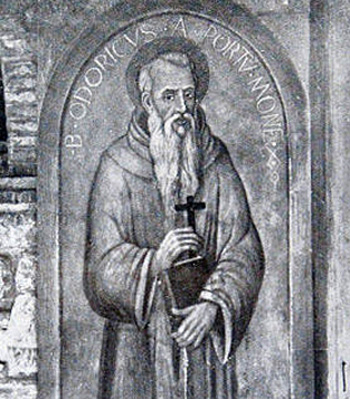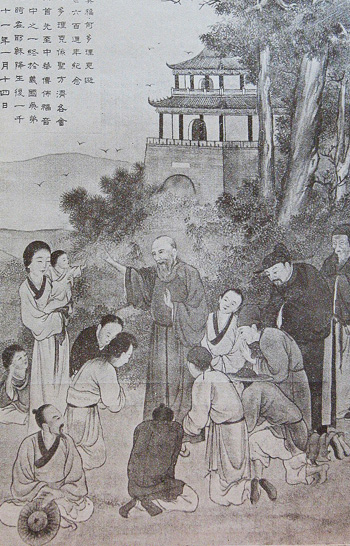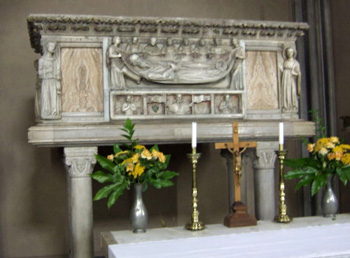The Saint of the Day
 |
 |
 |
 |
 |
 |
 |
Bl. Oderic of Pordenone - January 14
Biographical selection:
The Jesuits arrived in China at the end of the 16th century, but the first seeds of the Gospel had been planted there a long time before. There were significant signs that Catholicism was somehow established in China. Thus, in 1307 Pope Clement V named Giovanni de Montecorvino Archbishop of Peking and sent him to China with seven Franciscans. Among these missionaries was the Friar Oderic de Friuli, or Oderic of Pordenone.
Oderic was born at Villanoa, a hamlet now belonging to the town of Pordenone in Friuli in 1286. In his early years he entered the Franciscan Order.
 After various missionary assignments in Armenia, Media, Persia and India, he was sent to Peking, where he was hosted in the residence of the Grand Khan, and
his group was eventually given access to the Khan himself. The Minor Friars were given a special place in the Imperial Palace and enjoyed the privilege of walking in front of the Emperor and giving him a blessing at his grand feasts.
After various missionary assignments in Armenia, Media, Persia and India, he was sent to Peking, where he was hosted in the residence of the Grand Khan, and
his group was eventually given access to the Khan himself. The Minor Friars were given a special place in the Imperial Palace and enjoyed the privilege of walking in front of the Emperor and giving him a blessing at his grand feasts.
In his very popular account of his missionary exploits and the miracles he witnessed, Blessed Oderic reported curious facts that happened during his stay at the Peking Court, among them the following episode.
One day he was sitting under a tree with four friars not far from the path where the Emperor would pass. When they saw the Emperor approaching, one of the friars, a Bishop dressed his pontifical vestments, raised up the Cross and sang the Veni Creator. Hearing the melodious chanting, the Emperor asked the Princes who accompanied him who these men were.
 His attendants answered that they were Christian religious men. The Emperor called them before his presence. He stood before the Cross, took off his hat covered with pearls and kissed the Cross with humility, demonstrating respect and some prior knowledge of the Catholic Faith.
His attendants answered that they were Christian religious men. The Emperor called them before his presence. He stood before the Cross, took off his hat covered with pearls and kissed the Cross with humility, demonstrating respect and some prior knowledge of the Catholic Faith.
Since protocol required that none could approach the Emperor without offering something, Blessed Oderic presented him with a small basket of beautiful apples. The Emperor grasped two, took a bite from one and kept the others.
After 16 years of travel, Friar Oderic returned to Italy where he died at Pisa in 1331. His biographers say that he baptized thousands of pagans and worked many miracles. He was honored as a saint in the Patriarchate of Aquileia.
Comments of Prof. Plinio:
This is one of those little known lives of Saints that are very significant.
When we read that Friar Oderic was sent to China, we are led to believe that he will end his life as a martyr, suffering and persevering in the Faith through horrible Chinese tortures.
Nonetheless, here is a life of a Saint that does not end in catastrophes, but is filled with admirable scenes, which shows us that although martyrdom is sublime, one can become a saint by walking other paths.
I want to call your attention to two points in this selection.
First, our ancient Catholic history as well as the ancient history of the pagan world are filled with episodes brimming with symbolism and dense signification that could be painted.
Instead, contemporary history chooses to emphasize scenes of crimes. The great facts of contemporary history take place and are described without any symbolic content, turned straightforwardly to efficiency and work. Those who constitute part of the panorama of these scenes have a materialist spirit, which does not allow them to understand how symbolic scenes nourish and refresh the spirit.
Second, let us analyze this scene filled with beauty.
You know that the Emperors of China lived in a palace that was an actual city – the Imperial City – of monumental scale and central importance. Enclosed in that vast palace complex were various palaces, many buildings and marvelous gardens. That palace was forbidden to all those who were not part of the Emperor's court.
 You can imagine those five Franciscans, with that forthright spirit proper to medieval men, appearing as true Franciscans with tonsures and beards, habits and rope cinctures,
sitting under a tree inside the Imperial Palace, talking together amid the perfumes and beauties of that place.
You can imagine those five Franciscans, with that forthright spirit proper to medieval men, appearing as true Franciscans with tonsures and beards, habits and rope cinctures,
sitting under a tree inside the Imperial Palace, talking together amid the perfumes and beauties of that place.
What were they talking about? We do not know. Perhaps they were analyzing the possibilities for their apostolate, comparing China with Europe in order to find the best way to bring that people to the Catholic Faith. They were thus talking when the Emperor passed by.
Here is already a beautiful scene. Five sons of St. Francis born from that great epopee that started in Assisi and spread over all the lands are sitting in the garden of the Imperial Palace in Peking. Suddenly a murmur arises and it is the Emperor himself who is passing with his entourage and Prince attendants.
The five friars stand up and, instead of reacting with human respect or fear, one of them, a Bishop dressed in his solemn vestments, raises up a beautiful Cross in the sight of the Emperor.
One might say that it was a provocation, but no, it was the love of God in an ardent missionary spirit. That Bishop may have been thinking: "Here is the man who can do everything for his country. It is my hope that, by means of this Cross, Our Lord Jesus Christ will speak to the Great Khan and make him aware of His Divinity in his soul." He raises the Cross and presents himself in this way to the Emperor.
And the result? The Emperor stops and asks: Who are these men? The reply: They are Christians.
He takes off his hat inlaid with pearls and kisses the Cross: A beautiful scene showing his respect and courtesy. It is an act of respect of the Emperor for Our Lord Jesus Christ; probably he did know Who Our Lord was, but he had some vague notion and wanted to pay homage to Him.
Then, there is the need to offer something to follow proper protocol; no one can approach the imperial presence without giving the Great Khan something.
 So, Friar Oderic approaches with a small basket of apples to offer to the Emperor. It is the poor gift of a Franciscan, but very artistic. What can one offer to a man who has every possible treasure? There cannot be anything more poor and simple than a small basket of apples. So, Blessed Oderic, with that naturalness that is a characteristic of his Franciscan Order, offers the apples to the Emperor.
So, Friar Oderic approaches with a small basket of apples to offer to the Emperor. It is the poor gift of a Franciscan, but very artistic. What can one offer to a man who has every possible treasure? There cannot be anything more poor and simple than a small basket of apples. So, Blessed Oderic, with that naturalness that is a characteristic of his Franciscan Order, offers the apples to the Emperor.
The Emperor accepts and, as a sign of his great confidence in the friar, eats a part of one apple. It is an act of confidence because the apple could be poisoned. He takes a bite from one and keeps the other as if to say: "I want this to keep a memory of you."
The scene ends with this fugacious contact between Our Lord Jesus Christ and the mightiest Chinese man on earth.
Now, what is the meaning of this scene? In a nutshell, it is the meeting of two religions, one true and the other false, the meeting of two civilizations, Catholic and pagan; the meeting of two different kinds of splendors, because Catholic Civilization is represented here by Franciscan poverty and by Jesus Christ, stripped almost naked and nailed on a Cross, while pagan civilization is represented by all types of richness. This meeting suggests many reflections and digressions.
Then there is the supernatural aspect of that meeting, because the Emperor certainly received a grace at that meeting, all the more so because among those Franciscans was the holy friar Blessed Oderic.
What were the plans of God for the Emperor had he converted? If all China would have converted in the wake of the Emperor's conversion, if China would have become a Catholic nation, the destiny of the world could have been different.
We can imagine the prayers and the ejaculations of those Franciscans as the scene was unfolding. We can imagine the fight between Angels and devils that was taking place around the Emperor. Here we have a scene filled with significance.
Many times it is in moments like this that the histories of peoples are decided.
 After three years in Peking, the Saint returned to Italy and died there. The Church declared him a Blessed. He is also honored as a Saint in the Patriarchate of Aquileia.
After three years in Peking, the Saint returned to Italy and died there. The Church declared him a Blessed. He is also honored as a Saint in the Patriarchate of Aquileia.
The action of Blessed Oderic de Friuli goes far beyond that simple incident. He baptized thousands of people. That is, he planted the seeds of a Catholic Church in China. Therefore, the fight for or against Our Lord was not decided only in that single episode. China had many opportunities to convert. It did not convert, however, and we are seeing the consequences.
At any rate, this episode raises beautiful hopes that elevate the soul and do a good to it.
From Heaven this Saint should be glad because, forgotten by so many, he has been remembered today on a Continent that he did know even existed when he was alive. Here his example does a good that it no longer begets in China.
It is a mystery whether this country, which the Church has desired so greatly to convert, will present possibilities to be included in the Reign of Mary. It is a mystery.


The Saint of the Day features highlights from the lives of saints based on comments made by the late Prof. Plinio Corrêa de Oliveira. Following the example of St. John Bosco who used to make similar talks for the boys of his College, each evening it was Prof. Plinio’s custom to make a short commentary on the lives of the next day’s saint in a meeting for youth in order to encourage them in the practice of virtue and love for the Catholic Church. TIA thought that its readers could profit from these valuable commentaries.
The texts of both the biographical data and the comments come from personal notes taken by Atila S. Guimarães from 1964 to 1995. Given the fact that the source is a personal notebook, it is possible that at times the biographic notes transcribed here will not rigorously follow the original text read by Prof. Plinio. The commentaries have also been adapted and translated for TIA’s site.
The Jesuits arrived in China at the end of the 16th century, but the first seeds of the Gospel had been planted there a long time before. There were significant signs that Catholicism was somehow established in China. Thus, in 1307 Pope Clement V named Giovanni de Montecorvino Archbishop of Peking and sent him to China with seven Franciscans. Among these missionaries was the Friar Oderic de Friuli, or Oderic of Pordenone.
Oderic was born at Villanoa, a hamlet now belonging to the town of Pordenone in Friuli in 1286. In his early years he entered the Franciscan Order.

Overview of the Imperial City complex
In his very popular account of his missionary exploits and the miracles he witnessed, Blessed Oderic reported curious facts that happened during his stay at the Peking Court, among them the following episode.
One day he was sitting under a tree with four friars not far from the path where the Emperor would pass. When they saw the Emperor approaching, one of the friars, a Bishop dressed his pontifical vestments, raised up the Cross and sang the Veni Creator. Hearing the melodious chanting, the Emperor asked the Princes who accompanied him who these men were.

Since protocol required that none could approach the Emperor without offering something, Blessed Oderic presented him with a small basket of beautiful apples. The Emperor grasped two, took a bite from one and kept the others.
After 16 years of travel, Friar Oderic returned to Italy where he died at Pisa in 1331. His biographers say that he baptized thousands of pagans and worked many miracles. He was honored as a saint in the Patriarchate of Aquileia.
Comments of Prof. Plinio:
This is one of those little known lives of Saints that are very significant.
When we read that Friar Oderic was sent to China, we are led to believe that he will end his life as a martyr, suffering and persevering in the Faith through horrible Chinese tortures.
Nonetheless, here is a life of a Saint that does not end in catastrophes, but is filled with admirable scenes, which shows us that although martyrdom is sublime, one can become a saint by walking other paths.
I want to call your attention to two points in this selection.
First, our ancient Catholic history as well as the ancient history of the pagan world are filled with episodes brimming with symbolism and dense signification that could be painted.
Instead, contemporary history chooses to emphasize scenes of crimes. The great facts of contemporary history take place and are described without any symbolic content, turned straightforwardly to efficiency and work. Those who constitute part of the panorama of these scenes have a materialist spirit, which does not allow them to understand how symbolic scenes nourish and refresh the spirit.
Second, let us analyze this scene filled with beauty.
You know that the Emperors of China lived in a palace that was an actual city – the Imperial City – of monumental scale and central importance. Enclosed in that vast palace complex were various palaces, many buildings and marvelous gardens. That palace was forbidden to all those who were not part of the Emperor's court.

Gardens of the Chinese Imperial Palace
What were they talking about? We do not know. Perhaps they were analyzing the possibilities for their apostolate, comparing China with Europe in order to find the best way to bring that people to the Catholic Faith. They were thus talking when the Emperor passed by.
Here is already a beautiful scene. Five sons of St. Francis born from that great epopee that started in Assisi and spread over all the lands are sitting in the garden of the Imperial Palace in Peking. Suddenly a murmur arises and it is the Emperor himself who is passing with his entourage and Prince attendants.
The five friars stand up and, instead of reacting with human respect or fear, one of them, a Bishop dressed in his solemn vestments, raises up a beautiful Cross in the sight of the Emperor.
One might say that it was a provocation, but no, it was the love of God in an ardent missionary spirit. That Bishop may have been thinking: "Here is the man who can do everything for his country. It is my hope that, by means of this Cross, Our Lord Jesus Christ will speak to the Great Khan and make him aware of His Divinity in his soul." He raises the Cross and presents himself in this way to the Emperor.
And the result? The Emperor stops and asks: Who are these men? The reply: They are Christians.
He takes off his hat inlaid with pearls and kisses the Cross: A beautiful scene showing his respect and courtesy. It is an act of respect of the Emperor for Our Lord Jesus Christ; probably he did know Who Our Lord was, but he had some vague notion and wanted to pay homage to Him.
Then, there is the need to offer something to follow proper protocol; no one can approach the imperial presence without giving the Great Khan something.

Bl. Oderic preaching to Chinese people
The Emperor accepts and, as a sign of his great confidence in the friar, eats a part of one apple. It is an act of confidence because the apple could be poisoned. He takes a bite from one and keeps the other as if to say: "I want this to keep a memory of you."
The scene ends with this fugacious contact between Our Lord Jesus Christ and the mightiest Chinese man on earth.
Now, what is the meaning of this scene? In a nutshell, it is the meeting of two religions, one true and the other false, the meeting of two civilizations, Catholic and pagan; the meeting of two different kinds of splendors, because Catholic Civilization is represented here by Franciscan poverty and by Jesus Christ, stripped almost naked and nailed on a Cross, while pagan civilization is represented by all types of richness. This meeting suggests many reflections and digressions.
Then there is the supernatural aspect of that meeting, because the Emperor certainly received a grace at that meeting, all the more so because among those Franciscans was the holy friar Blessed Oderic.
What were the plans of God for the Emperor had he converted? If all China would have converted in the wake of the Emperor's conversion, if China would have become a Catholic nation, the destiny of the world could have been different.
We can imagine the prayers and the ejaculations of those Franciscans as the scene was unfolding. We can imagine the fight between Angels and devils that was taking place around the Emperor. Here we have a scene filled with significance.
Many times it is in moments like this that the histories of peoples are decided.

Bl. Oderic's sarcophagus in Udine, Italy
The action of Blessed Oderic de Friuli goes far beyond that simple incident. He baptized thousands of people. That is, he planted the seeds of a Catholic Church in China. Therefore, the fight for or against Our Lord was not decided only in that single episode. China had many opportunities to convert. It did not convert, however, and we are seeing the consequences.
At any rate, this episode raises beautiful hopes that elevate the soul and do a good to it.
From Heaven this Saint should be glad because, forgotten by so many, he has been remembered today on a Continent that he did know even existed when he was alive. Here his example does a good that it no longer begets in China.
It is a mystery whether this country, which the Church has desired so greatly to convert, will present possibilities to be included in the Reign of Mary. It is a mystery.

 | |
|
|
The texts of both the biographical data and the comments come from personal notes taken by Atila S. Guimarães from 1964 to 1995. Given the fact that the source is a personal notebook, it is possible that at times the biographic notes transcribed here will not rigorously follow the original text read by Prof. Plinio. The commentaries have also been adapted and translated for TIA’s site.


